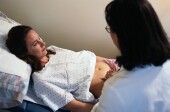
FRIDAY, Feb. 17 (HealthDay News) — Complication rates for women older than 50 who become pregnant through egg donation are similar to those of younger women, according to a new study.
The finding contradicts epidemiological data suggesting that these older women are at higher risk for pregnancy complications such as hypertension (high blood pressure), gestational diabetes, premature birth and placenta abnormalities, the Columbia University Medical Center researchers said.
The study included a group of about 100 women 50 and older and another group of women 42 and younger, all of whom became pregnant from egg donation.
Both groups had similar rates of gestational hypertension and diabetes, Cesarean delivery, and premature birth. Two of the older women experienced serious complications, including one who died, according to a medical center news release.
In one of those cases, a 56-year-old developed heavy vaginal bleeding at 29 weeks of pregnancy and required an emergency cesarean hysterectomy to deliver two weeks later. In another, a 49-year-old woman died after she suffered acute cardiac arrest in her first trimester. The researchers believe her death was unrelated to her pregnancy, but rather due to her heavy smoking.
All women who use egg donation to become pregnant are at increased risk for obstetrical complications, but older women do not appear to have a greater risk than younger women, the study authors concluded.
“It is imperative that all older women undergo thorough medical screening before attempting pregnancy to ensure the best possible outcome,” study author Dr. Mark Sauer, a professor of obstetrics and gynecology, said in the news release. “But, really, that should apply to younger women, as well.”
“Although many social and ethical questions surround the use of assisted reproductive technology by this age group, the current study confirms the high success rate and relative safety of such pregnancies in well-cared-for women,” co-author Dr. Daniel Kort, a postdoctoral fellow in obstetrics and gynecology, said in the release.
The study appears in the February issue of the American Journal of Perinatology.
More information
The U.S. Department of Health and Human Services, Office on Women’s Health has more about infertility and treatments.

